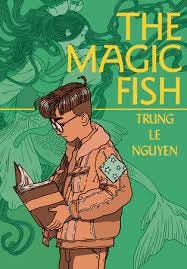Thinking about Vietnamese American literature & the beauty of Trung Le Nguyen's graphic novel, The Magic Fish
by Rachel Amaru, co-founder
In 2005-06, my family took a ten-month trip around the world. We spent a good part of that time in Asia, primarily Thailand, Vietnam, Laos, and Cambodia, with a short stop in Singapore. I’d been obsessed for many years about Vietnam, particularly about the Vietnam War (or the American War – depending on perspective), partly because my uncle was a Vietnam vet; partly because my father, a history professor, taught about it, and introduced me to the topic at a relatively young age; and partly because it has occupied (and continues to occupy) so much of the American imagination in literature and film. The coalescence of the Vietnam War and the Civil Rights era became a serious rabbit hole for me. From Camelot and the Kennedys to Johnson and the passage of the Voting Rights Act, to burning draft cards, to POWs, to the protesters – hippies and returning vets; to race issues affecting those in the US, to race issues affecting soldiers serving in the army; to PTSD and contemporary studies of trauma… I just kept digging deeper, eventually having the privilege of visiting Vietnam and more recently, of teaching expressive writing workshops to vets, including some who served in Vietnam.
We spent two weeks in what was formerly South Vietnam, and two weeks in the north. Tim O’Brien’s opus was in my head – especially The Things They Carried. On a pure fluke of coincidence, we ended up visiting the site of My Lai on the actual anniversary of the massacre, March 16th. (Years after this visit, I would write about my travels there in a non-fiction writing class with a quite brilliant young teacher who asked me to please tell the students, mostly in their 20s and 30s, what My Lai was. It made me aware that this obsession of mine did not haunt everyone as it had me. It is the same shock I feel when it is pointed out to me how little knowledge our younger generation has of the Holocaust. See this 50-state survey on Holocaust knowledge of American Millenials and Gen Z).
While in Vietnam, I re-read Graham Greene’s The Unquiet American, but I also read, for the first time, one of the most famous novels by a Vietnamese vet, Bao Ninh’s The Sorrow of War. I have continued to read memoirs, novels, and poetry by US vets about their experiences, and by their children, including some who returned to Vietnam to explore in their parent’s footsteps. (Tom Bissell’s The Father of All Things and Danielle Trussoni’s Falling Through the Earth are particularly good). But more recently, I have been inspired to read the literature being written by young Vietnamese and Vietnamese Americans, including the poetry and memoir of Ocean Vuong, Night Sky With Exit Wounds and On Earth We’re Briefly Gorgeous; The Sympathizer and the collection of short stories, The Refugees, by Viet Tanh Nguyen; and The Mountains Sing by Nguyen Phan Que Mai, a novel featured by the Book of the Month Club. (For more suggestions, see prize-winning author Eric Ngyuen’s list of “10 essential books by Vietnamese American Writers.” I’ve just ordered his own well-reviewed novel Things We Lost To The Water).
I’ve mentioned before that Good Trouble For Kids has given me a significantly greater appreciation for graphic novels. I read Trung Le Nguyen’s The Magic Fish in one sitting, charmed not only by the inclusion of fairy tales, but of its gentle presentation of a boy coming out as gay to his Vietnamese immigrant parents. Nguyen’s book illustrates the healing power of stories. As much as I encourage the reading of antiracist texts, like Ibram X. Kendi’s How To Be An Antiracist, I really do believe that the greatest way for all of us – whatever our race, creed, cultural background – to really begin to understand one another, and to see one another (no color-blindness), is through literature and art. The influx of Vietnamese American literature offers a lens for readers to revisit not only the war and all that remains haunting about it, but to begin to understand also what it meant to the Vietnamese who fought in it, to the Vietnamese who immigrated here (often as refugees), and to the children they had in America. Literature of all kinds – children’s books, YA lit, adult novels, memoirs, poetry, and non-fiction -- all offer meaningful and deep ways of exploring the complexity of identity. We all have our fairy tales, we all have stories to tell. Really listening to these stories can be an antidote to hate and ignorance, and possibly a newfound recognition of what it means to be an ‘American.’ And, in terms of GTFK’s focus on the need for diverse libraries at home and in academia, books like Nguyen’s offer an important and accessible means for young people to explore racial and cultural identity. We need more books like The Magic Fish.
Violence against Asian Americans is very much on the rise, especially during Covid. We encourage you to consider donating to organizations working to support Asian American communities. This list in New York Magazine offers some suggestions.
See here for an interview with Trung Le Nguyen (also known as Trungles), that focuses on his love of fairy tales.
For those of you interested in reading more Asian American poetry, please visit Poetry Foundation’s “Asian American Voices: A collection of poets and articles exploring Asian American culture”


